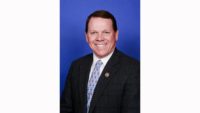One of the most crucial House committees for the construction industry will get a new leader when the 113th Congress convenes in January. House Republicans on Nov. 28 picked William "Bill" Shuster (R-Pa.) to be the next chairman of the Transportation and Infrastructure Committee.
The T&I panel oversees most major federal public-works programs, including highways, transit, airports, Corps of Engineers civil works and Environmental Protection Agency wastewater treatment.
Major issues facing Shuster when he takes the gavel next year include drafting a new Water Resources Development Act (WRDA) and a passenger-rail reauthorization and, most importantly, starting to develop a new surface-transportation bill.
The current highway-transit measure, the Moving Ahead for Progress in the 21st Century Act (MAP-21), expires on Sept. 30, 2014. Well before then, Shuster is expected to hold hearings and begin work on MAP-21's successor.
Jay Hansen, National Asphalt Pavement Association executive vice president, says, "Really, the major priority that he's going to have to have ... would be to find a long-term revenue source for the Highway Trust Fund," whose highway account is expected to drop into the red after MAP-21 lapses.
Before tackling highways and transit, Shuster is expected to focus on a new WRDA. One challenge will be to produce and pass a WRDA without earmarks. Earlier WRDAs were filled with provisions specifying funds for many locks and dams, dredging and environmental projects, solidifying votes from their House and Senate sponsors.
 |
| SHUSTER |
Shuster, 51, has been on the T&I panel since he was elected in 2001. He succeeds Chairman John Mica (R-Fla.), who was about to hit the House GOP six-year limit for being a committee chair or ranking minority member. Mica asked House Republican leaders to waive the term-limit rule but was turned down. He then endorsed Shuster.
Industry officials expect Shuster to be a strong leader. Jeffrey Shoaf, Associated General Contractors senior executive director for government affairs, calls Shuster "extremely organized and extremely focused" and notes that he helped Mica sell MAP-21 to GOP colleagues.
Hansen says that, in the surface transportation arena, Shuster will "articulate clearly what his vision is and expect [outside stakeholders] to march … in tune with him."
Shuster is a familiar name on the panel: Bill's father, E.G. "Bud" Shuster, wielded substantial power as committee chairman from 1995 to early 2001.



